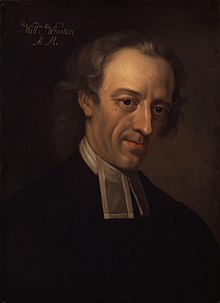William Whiston | |
|---|---|
 Portrait by Sarah Hoadly, c. 1720 | |
| Born | 9 December 1667 Norton-juxta-Twycross, Leicestershire, England |
| Died | 22 August 1752 (aged 84) Lyndon, Rutland, England |
| Nationality | English |
| Alma mater | Clare College, Cambridge |
| Known for | Translating the works of Josephus, catastrophism, isoclinic maps, work on longitude |
| Scientific career | |
| Fields | Mathematics, theology |
| Institutions | Clare College, Cambridge |
| Academic advisors | Isaac Newton Robert Herne |
| Notable students | James Jurin |
| Signature | |
William Whiston (9 December 1667 – 22 August 1752) was an English theologian, historian, natural philosopher, and mathematician, a leading figure in the popularisation of the ideas of Isaac Newton. He is now probably best known for helping to instigate the Longitude Act in 1714 (and his attempts to win the rewards that it promised) and his important translations of the Antiquities of the Jews and other works by Josephus (which are still in print). He was a prominent exponent of Arianism and wrote A New Theory of the Earth.
Whiston succeeded his mentor Newton as Lucasian Professor of Mathematics at the University of Cambridge. In 1710 he lost the professorship and was expelled from the university as a result of his unorthodox religious views. Whiston rejected the notion of eternal torment in hellfire, which he viewed as absurd, cruel, and an insult to God. What especially pitted him against church authorities was his denial of the doctrine of the Trinity, which he believed had pagan origins.